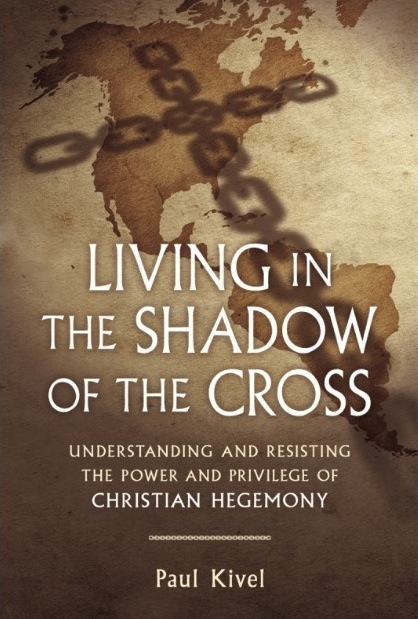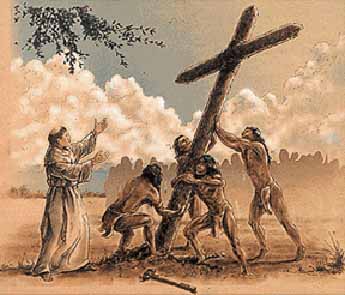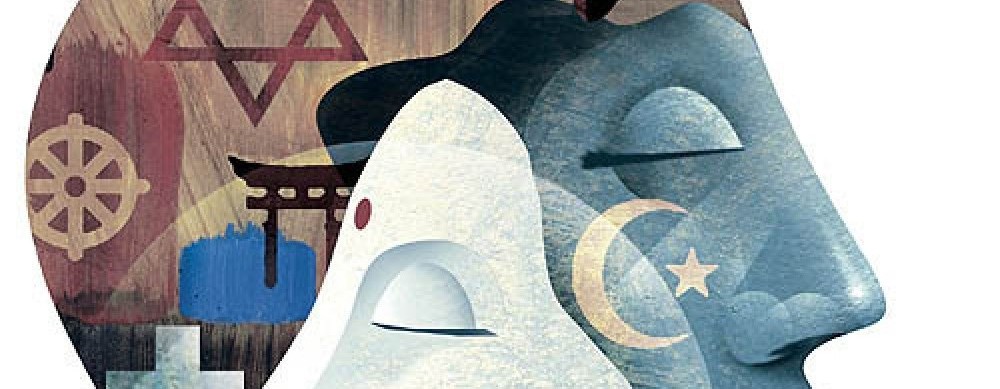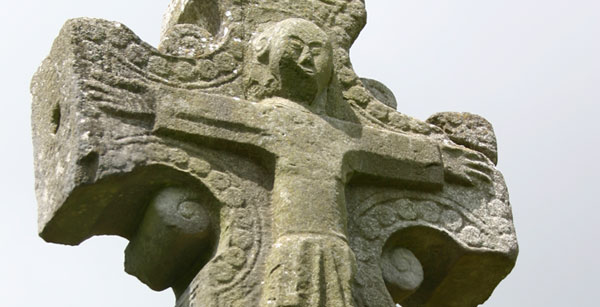Table of Contents

-
- Christian Culture in US Schools
- What is Christian Hegemony?
- The Christian Holiday Cycle
- Christian Zionism
- Christian Hegemony and the Everyday Impact of Christian Hegemony
- Preface of Living in the Shadow of the Cross
- Manifest Destiny and War
- The Body, Desire and Disability
- Environmental Issues
- Guidelines for Christian Allies
- Resources on Christian Hegemony and Resistance
- Bibliography of Living in the Shadow of the Cross
- The Cosmic Battle: Good and Evil
- The Crusades Are Still Being Fought
- The Inquisitions
“Christian Culture in US Schools“ by Paul Kivel
Excerpt: “Christian institutions have also played a deep, founding, and shaping role in US school systems. The spiritual practices of students and their families and communities are not the issue here but rather how all students become oriented in a society in which Christianity plays a dominating role as Christian hegemony. Hegemony in this sense refers to whatever is part of the systematic, day-to-day, institutionalized, taken-for-granted routine in a given culture: the “default position.” Because we identify “oppression” as the systematic, daily, routine dominance and mistreatment of a target group by a nontarget group, we in effect identify such “isms” as racism and sexism as hegemonies. An easily understood, obvious example of Christian hegemony in the United States is the observance of Christmas, observed throughout the business and civic world as a holiday that saturates all aspects of US culture for believers, nonbelievers, and “secular” Christians alike for more than a month every year.”
“What is Christian Hegemony?” by Paul Kivel
Excerpt: I define Christian hegemony as the everyday, systematic set of Christian values, individuals and institutions that dominate all aspects of US society. Nothing is unaffected.
Christian dominance is a complex and shifting system that benefits all Christians, those raised Christian and those passing as Christian. However, the concentration of power and wealth accumulates to a predominantly Christian power elite. All others experience exploitation and constant vulnerability to violence.
 “The Christian Holiday Cycle” by Paul Kivel
“The Christian Holiday Cycle” by Paul Kivel
Excerpt: “Holidays are great when they reaffirm our connections to family and friends, are inclusive, build community and honor accurate histories. Holidays are also important when they celebrate significant cultural events and connect us to our deepest communal values. However, holidays can be destructive when they celebrate war or colonialism, are promoted aggressively or when corporations use them to promote values hostile to our environment and us. Holidays become destructive and exclusive when they are proclaimed as universal but are actually culturally specific or when they are based on historical lies and perpetuate misinformation. We need to think seriously about what we celebrate and why, who is included or excluded in the celebration and what values are implicitly or explicitly communicated.”
“Christian Zionism” by Paul Kivel
Excerpt: “Christian Zionism is an often-overlooked example of the powerful role Christians and Christian institutions play in US foreign policy. During the Crusades, Christians believed Jerusalem and the surrounding land belonged not to the Arabs who lived there, and not even to the Jews who would need to return, but to them because it was the site of Jesus’ birth and of end time scenarios in Revelation.1 The first crusades were fought explicitly to create a European Christian colony in Palestine. Dominant Christianity never gave up the belief that Jerusalem was a promised land, essential to God’s plan. Support for the gathering of Jews to the Holy Land was believed to be a necessary strategy in preparation for the apocalypse.”
“Christian Hegemony and the Everyday Impact of Christian Hegemony” by Paul Kivel, adapted from Privilege: A Reader
Excerpt: In the summer of 2012 Muslim Americans experienced numerous violent attacks and harassment such as the burning to the ground of a mosque in Missouri; the firing of an air rifle at the Muslim Education Center in Illinois while 500 people were praying; the throwing of a homemade bomb at a Muslim school in Illinois and a Muslim home in Florida; harassment by teens of worshipers at a California mosque; and the vandalism and desecration of other mosques across the country.
“Preface of Living in the Shadow of the Cross” by Paul Kivel
Excerpt: Like most people, I was vaguely aware of the Crusades, Inquisitions, Witch-Hunts and the colonization of the Americas. Historically, my family was affected by Christian anti-Semitism that produced Russian pogroms, the Nazi holocaust and hate crimes in the US. On a more personal level, I regularly had to explain why I took Jewish holidays off at school and work and put up with missionaries at my front door. The fourth grade public school teacher of our oldest son gave out pocket Bibles to reward her students, whether they were Christian or not. It should not have been so hard to see the bigger picture. Yet it was.
“Manifest Destiny and War” by Paul Kivel
Excerpt: Manifest Destiny, the belief that the US has a special role in the unfolding of God’s global plan, implicitly expresses a deeply held racism: people of color, even if Christian (and especially if they are not), are seen as fundamentally flawed. Derived from the Christian binary of good and evil, the racist division of people into categories of white and non-white perpetuates long-standing divisions between Christians and others. One might say that racism is a secularized version of Christian dominance with a patina of science to lend it credibility. Manifest Destiny extends this racism into US foreign policy.
“The Body, Desire and Disability” by Paul Kivel
Excerpt: The body plays a pivotal role in Christianity. Genesis is the story of the first human bodies: Eve and Adam are perfect, but they succumb to the temptation of the body, eat the fruit and are banished from the garden. The struggle to reclaim paradise and the pain-free, beautiful and immortal bodies of its initial inhabitants has guided the pursuit of Western science since its inception.
“Environmental Issues” by Paul Kivel
Excerpt: Belief in humans’ God-given right to dominion over the earth leads directly to justifying its exploitation. Most people would say that global climate change is one of the most serious issues facing human society. The United States, with only 5% of the world’s population, contributes about 45% of global carbon dioxide pollution, a main cause of global heating. And yet US national policies over the last 25 years have been cautious, resistant to change and, at times, even belligerently against measures that might mitigate our society’s global impact.
“Guidelines for Christian Allies” by Paul Kivel
Excerpt: If you are Christian or were raised Christian there are many concrete things you can do to counter Christian hegemony:
* Learn the history of Christianity, its impact on other peoples and the history of the denomination you belong to and/or grew up in.
* Notice the operation of Christian dominance in your everyday life. Consider how Christian concepts affect the way you think.
* Examine how you may have internalized judgments about yourself based on Christian teachings. Have you cut yourself off from your body, from natural expressions of your sexuality or spirituality or from connections to the natural world?
“Resources on Christian Hegemony and Resistance” by Paul Kivel
Excerpt: Websites and organizations that actively address and resist Christian Hegemony.
“Bibliography of Living in the Shadow of the Cross” by Paul Kivel
Excerpt: Complete citations from the latest publication of Living in the Shadow of the Cross.
“The Cosmic Battle: Good and Evil” by Paul Kivel
Excerpt: A major Christian belief, connected to this binary framework, is that everything not associated with good and Godliness is connected to the devil (Satan) and his minions. Being opposite, or the Other, is interpreted as being in opposition to God. The world is understood to be a stage for cosmic struggle.
“The Crusades are Still Being Fought” by Paul Kivel
Excerpt: The Crusades were a long series of religious wars spanning a period of nearly 600 years (1095 to 1699). They were crucial in the formation of a European (and subsequently western) Christian identity and have left a deep mark on western thinking. The word “crusade” is used for political and religious purposes (as when President Bush referred to our aggression in the Middle East as a Crusade,1 and even for secular ones (as in the Avon Foundation’s Crusade against Breast Cancer), but always resonates with images of good white Christian knights fighting against evil.
“The Inquisitions” by Paul Kivel
The Inquisitions were, in many ways, a continuation of the crusades. Instead of fighting Infidels these wars were against Christians who were described as heretics. They began when the crusade against the Cathars was winding down as an attempt to finish the process of eliminating them.2 The subsequent Inquisitions attacked heretics and converted Jews and Muslims, and eventually other marginalized groups such as lepers, witches (women), prostitutes, and homosexuals. Their goal was to police the boundaries of acceptable belief and behavior within the Christian world and within the psyche of each person…
Israel/Palestine. Clearly influential in shaping U.S. policy are the
U.S. military, the powerful U.S. arms industry, multinational oil
companies, the U.S. government’s attempt to control access to
regional oil resources, the U.S. government’s desire for a proxy
military force that can carry out U.S. foreign policy goals in the
area, and high levels of anti-Muslim and anti-Arab racism among
U.S. government officials and advisors. Other factors, as well, play
significant but less dominant roles in the shaping of U.S. policy. The


